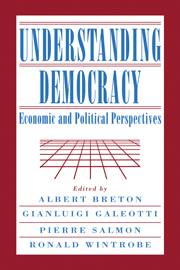Introduction
Published online by Cambridge University Press: 05 December 2011
Summary
Renewed interest in democracy–in its virtues and limitations, in its relationships to liberty, security, and stability, and in its connections to a variety of attributes such as its capacity to solve collective problems–has been motivated to a considerable degree by developments that have taken place over the last fifteen to twenty years. Foremost among these developments is the fact that a number of countries in the Americas and in Europe that had never experienced democracy, or had not been ruled democratically for many years, recently opted for that form of governance. Of considerable importance also is the fact that many of the countries that have recently chosen democracy had, for decades, functioned under the rules and conventions characteristic of planned collectivist systems. This fact has posed the question of whether democracy is compatible with economic collectivism or whether it requires the more or less simultaneous adoption of a capitalist market system. Conversely, inasmuch as people in these newly democratic countries are primarily concerned with their economic well-being, the question of whether the transition to a market economy is easier or more difficult under democracy has also been pushed to the fore. Of equal importance is the fact that the disappearance of economic collectivism as an alternative to capitalism (for the time being at least) has fostered a reorientation of systemic thinking, on both sides of the ideological spectrum, toward the subject of democracy in all its dimensions–the nature of the system, the way it works or can be made to work, its prerequisites, its results, and so on.
- Type
- Chapter
- Information
- Understanding DemocracyEconomic and Political Perspectives, pp. 1 - 8Publisher: Cambridge University PressPrint publication year: 1997



